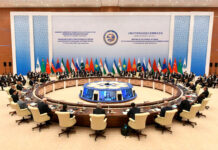ISLAMABAD: Pakistan was facing a $3.8 billion annual economic loss due to climate change whereas in view of the rising climate issue, especially in the developing countries like Pakistan, experts have urged developed countries to raise at least $100 billion every year in climate finance.
These views were expressed by climate experts and practitioners during an event, ‘Pre-COP26 Dialogue’ organised by the Institute of Regional Studies (IRS) in collaboration with the Civil Society Coalition for Climate Change (CSCCC), the Sustainable Development Policy Institute (SDPI), and the Embassy of France here on Wednesday.
The aim of the dialogue was sharing ideas on climate change in the run up to the 26th UN Climate Change Conference of the Parties (COP26) to be held in Glasgow from October 31 to November 12.
The participants of the event termed climate change a shared responsibility and urged the need for global partnership on the subject.
It is pertinent to mention here that Pakistan contributes only 1 per cent to the worldwide greenhouse gas emissions but was the 8th most vulnerable country in the world in terms of climate change.
While addressing the event Special Assistant to the Prime Minister (SAPM) on Climate Change, Malik Amin Aslam, said that for Pakistan, it is important to give the message at COP26 that despite being affected by climate change in an unjust manner, the country will adopt nature-based approaches to be a part of the solution to climate change.
Parliamentary Secretary for Foreign Affairs, Andleeb Abbas, stated that climate was a priority of the government and a personal focus of Prime Minister Imran Khan. She listed the ten billion tree tsunami project, the switch to cleaner fuel, and introduction of an electric vehicle policy as some of the achievements of the government.
British High Commissioner to Pakistan, Dr Christian Turner, shared that COP26 had four major goals: more national commitments on emission reduction by 2030, further support for vulnerable countries like Pakistan in terms of climate adaptation, climate finance mobilisation to the tune of $100 billion annually, and developing partnerships not only between governments but also with the private sector and civil society.
He stated that Pakistan was in a great position to assume global leadership on climate change owing to its climate vulnerability and its prioritisation of climate in national policy making.
Italian Ambassador to Pakistan Andreas Ferrarese shared that Italy and Pakistan will be co-hosting a side-initiative of COP26 on mountain climate in which Pakistan will play a central role in addressing challenges related to conservation of the central Karakoram ecosystem, meant to be a model for the world.
Charge D’ Affaires of France in Pakistan Yves Manville shared that the French government was supporting Pakistan in providing small grants to civil society organisations for projects on climate change and awarding climate scholarships to Pakistani students.
He added that the French government was also assisting the government of Pakistan directly through the French Development Agency. (FDA)
Urging the need for collaboration, CSCCC Chief Executive Aisha Khan said that climate diplomacy would be the most important aspect of bilateral and multilateral engagements in the future.
“This will require careful diplomacy and inspired leadership to leverage cooperation at the regional and international level.”
























